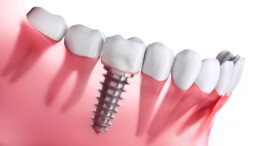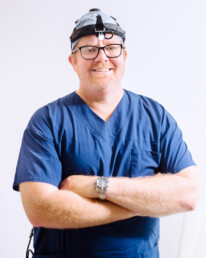Dental Implants

About Dental Implants
Dental implants allow new custom teeth to be securely and aesthetically placed in the mouth. Dental implants can replace a single missing tooth or replace all the teeth in the upper and/or lower jaws.
Dental implants are carefully, surgically placed in the bone, their specialised coating encouraging natural bone growth to secure them in place. Once stable, they act as a point of firm attachment for dental prostheses including single teeth/bridges/removable or fixed dentures. Due to their stable and firm attachment, they overcome many of the problems with traditional dentures and bridges.
Why might I need Dental Implant surgery?
People who have missing teeth or are soon to have a missing tooth may benefit from dental implants.
Many patients report dental implants are more comfortable, secure and visually attractive than dentures they had worn previously. They also report fewer problems when eating and talking as the teeth remain fixed rather than being at risk of moving. Adhesives are not required with implants. Biting and chewing are very similar to biting and chewing with normal teeth, allowing a return to a more balanced healthy diet.
Dental implant
An implant fixture is inserted into the jaw bone by Dr Tuckett to provide a base for supporting and attaching the prosthesis.
Implants may be made of different materials and attach in different ways. You and Dr Tuckett can discuss which is likely to be best for you.
Prosthesis
A dental prosthesis is an artificial tooth or row of artificial teeth which your Dentist will attach to the implant. The prosthesis may be a ‘crown’ to replace one missing tooth or a ‘bridge’ to replace several missing teeth. In a jaw with no teeth, the prosthesis covers almost the full dental arch. Some prostheses with many teeth are fixed permanently onto the implants with screws or special cement. Other types of prostheses can be taken out for daily cleaning.
What can I expect at my appointment?
At your initial consultation, Dr Tuckett will take a thorough history, perform a comprehensive examination and review any x-rays or CT scans which your may have organised. He will advise if any further investigations are required.
Dr Tuckett will explain to you the options available for your treatment condition and discuss the procedure and any associated risks in depth. He will also advise you of what to expect in the post-operative period.
What is involved with Dental Implant surgery?
Dr Tuckett will make an incision to open your gums. The implant is then inserted into the jaw bone using special techniques and instruments. The number of implants inserted by Dr Tuckett depends on the prosthesis. For example, one implant is used to replace one missing tooth. For a complete upper prosthesis having 12 artificial teeth, four or more implants may be needed.
The incision is closed with dissolvable stitches. These stitches dissolve within 7-14 days.
The bone surrounding the implant is allowed to heal for up to six months.
After healing, an ‘abutment’is inserted through the gums and into the implant. This can be done under local anaesthesia. The abutment is the foundation, support or connector for the prosthesis. The gums around the abutment are left to heal for several weeks. If the bone is adequate, the abutment may be inserted at the same time as the implant.
Your Dentist or Prosthodontist will then begin work on the prosthesis. The prosthesis may be fixed to the implant with cement or screws so that it is not removable. Or it may be attached in a way that allows it to be removed for cleaning.
Where will I have my dental implant surgery?
If only one or a few implants will be inserted, Dr Tuckett may give you a local anaesthetic with a needle. The local anaesthetic will numb the gums and the lower parts of the face.
For some people, Dr Tuckett may recommend general anaesthesia, that is putting them to sleep for the duration of the surgery. General anaesthesia is given by a specialist Anaesthetist who will put you to sleep and wake you up safely.
General Anaesthetic may be preferred in people who:
- Will have implants inserted into the lower jaw, upper jaw or both.
- Do not want to remain awake during the surgery.
- Will need major bone grafting.
After surgery care
After your procedure, Dr Tuckett will provide you with specific instructions regarding your post-operative care, general instructions are available here.

About Dr Joel Tuckett
Dr Tuckett is a contemporarily trained Oral and Maxillofacial Surgeon. He engages in a patient centred approach to ensure a caring and comfortable journey from initial consultation to discharge.
Dr Tuckett is and internationally published author in the fields of Facial trauma, Antibiotic stewardship, Radiotherapy induced Xerostomia, Parotid surgery and Head and Neck cancer. He is a senior lecturer at the University of Queensland where he educates both medical and dental students.
He currently has public appointments at the Princess Alexandra, STARS and Mackay Base hospitals where he works to train the new generation of surgeon.
